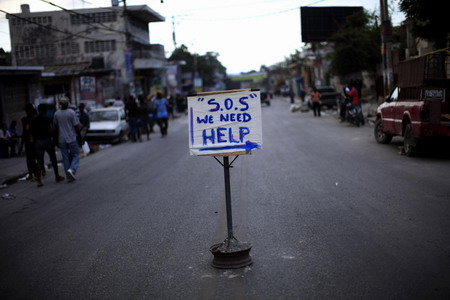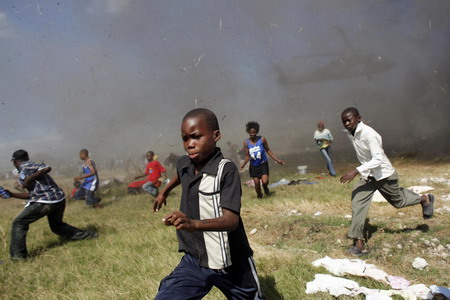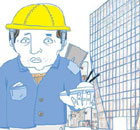Asia-Pacific
Hunger and hope, thirst and frenzy grip Haiti
(Agencies)
Updated: 2010-01-17 10:45
 |
Large Medium Small |
|
 A sign witch reads 'SOS we need help' is seen in the middle of a street after Tuesday's earthquake in Port-au-Prince, January 16, 2010. [Agencies] |
More American help was on the way: The US Navy hospital ship Comfort steamed from the port of Baltimore on Saturday and was scheduled to arrive here Thursday. More than 2,000 Marines were set to sail from North Carolina to support aid delivery and provide security.
But for the estimated 300,000 newly homeless in the streets, plazas and parks of Port-au-Prince, help was far from assured.
Denis's home was intact, and he and his elderly parents have some reserves, but, he said, "in a week, I don't know."
Aid delivery was still bogged down by congestion at the Port-au-Prince airport, quake damage at the seaport, poor roads and the fear of looters and robbers.
The problems at the overloaded airport forced a big Red Cross aid mission to strike out overland from Santo Domingo, almost 200 miles away in the Dominican Republic. The convoy included up to 10 trucks carrying temporary shelters, a 50-bed field hospital and some 60 medical specialists.
"It's not possible to fly anything into Port-au-Prince right now. The airport is completely congested," Red Cross spokesman Paul Conneally said from the Dominican capital.
Another convoy from the Dominican Republic steered toward a U.N. base in Port-au-Prince without stopping, its leaders fearful of sparking a riot if they handed out aid themselves.
The airport congestion touched off diplomatic rows between the US military and other donor nations.
France and Brazil both lodged official complaints that the US military, in control of the international airport, had denied landing permission to relief flights from their countries.
Defense Minister Nelson Jobim, who has 7,000 Brazilian U.N. peacekeeping troops in Haiti, warned against viewing the rescue effort as a unilateral American mission.
The squabbling prompted Haitian President Rene Preval, speaking with the AP, to urge all to "keep our cool and coordinate and not throw accusations."
At a simpler level, unending logistical difficulties dogged the relief effort.
A commercial-sized jet landed with rescue and medical teams from Qatar, only to find problems offloading food aid. They asked the US military for help, surgeon Dr. Mootaz Aly said, and were told: "We're busy."
|
 People run from the downdraft as a US aid helicopter takes off after delivering supplies in Port-au-Prince January 16, 2010. [Agencies] |
As relief teams grappled with on-the-ground obstacles, the US leadership promised to step up aid efforts. In Washington, Obama joined with his two most recent White House predecessors to appeal for Americans to donate to the cause.
"We stand united with the people of Haiti, who have shown such incredible resilience," he said.
Their resilience was truly being tested, however.
On a back street in Port-au-Prince, a half-dozen young men ripped water pipes off walls to suck out the few drops inside. "This is very, very bad, but I am too thirsty," said Pierre Louis Delmar.
Outside a warehouse, hundreds of desperate Haitians simply dropped to their knees when workers for the agency Food for the Poor announced they would distribute rice, beans and other supplies. "They started praying right then and there," said project director Clement Belizaire.
Children and the elderly were asked to step first into line, and some 1,500 people got food, soap and rubber sandals until supplies ran out, he said.
The aid official was overcome by the tragic scene. "This was the darkest day of everybody living in Port-au-Prince," he said.












